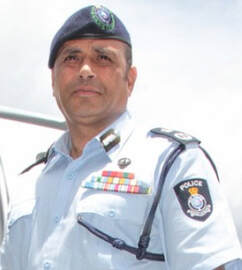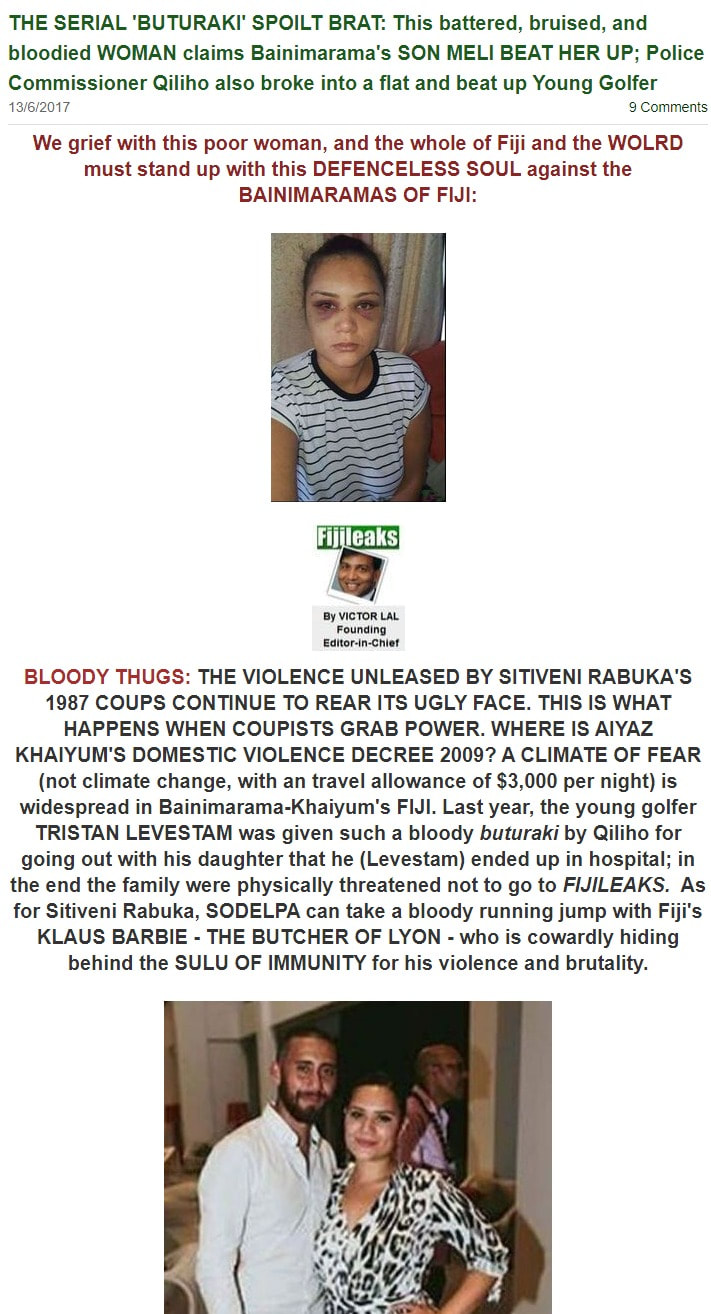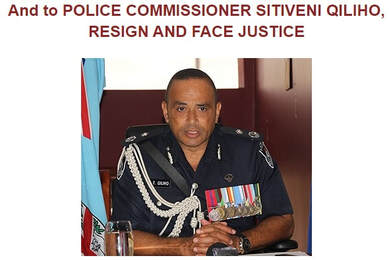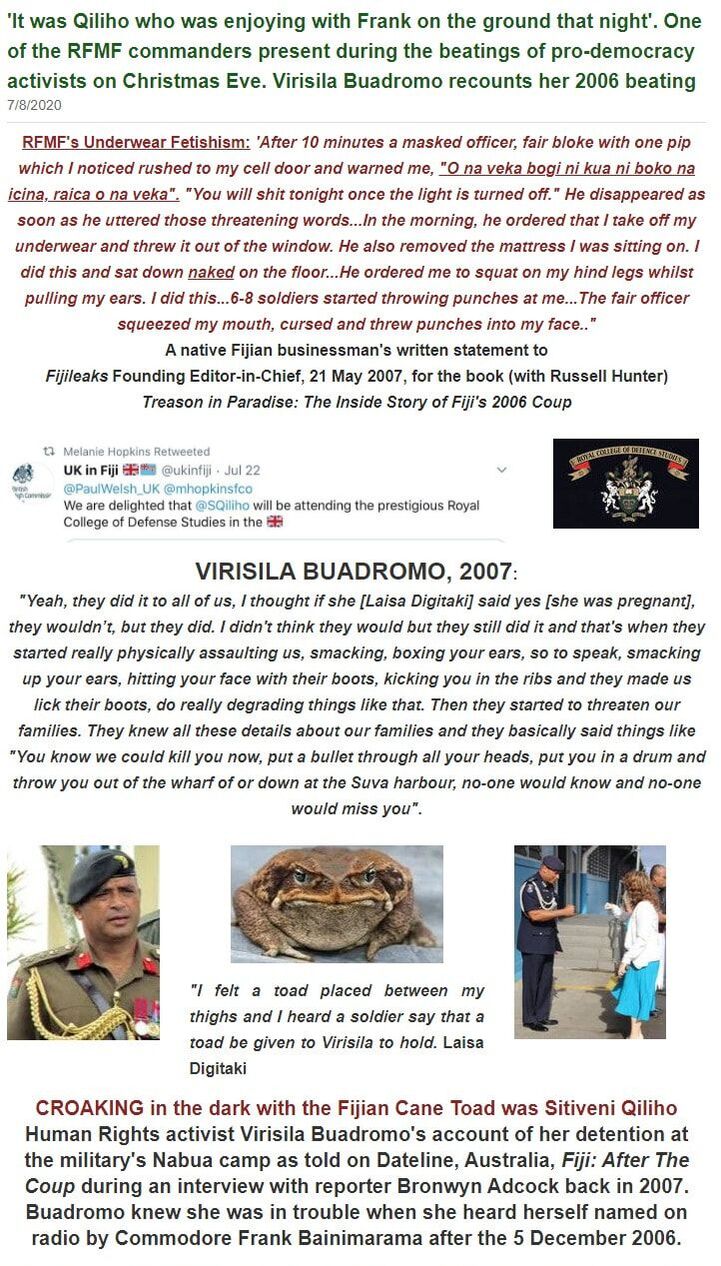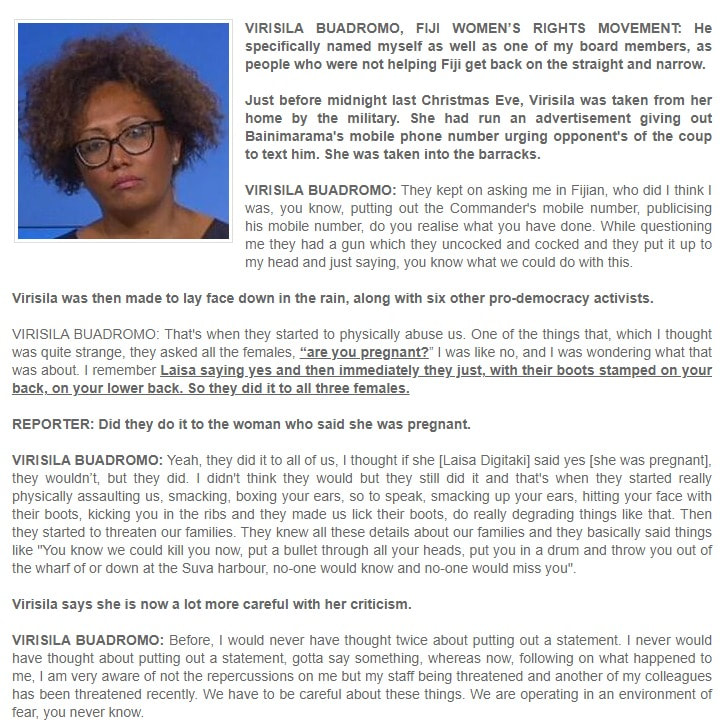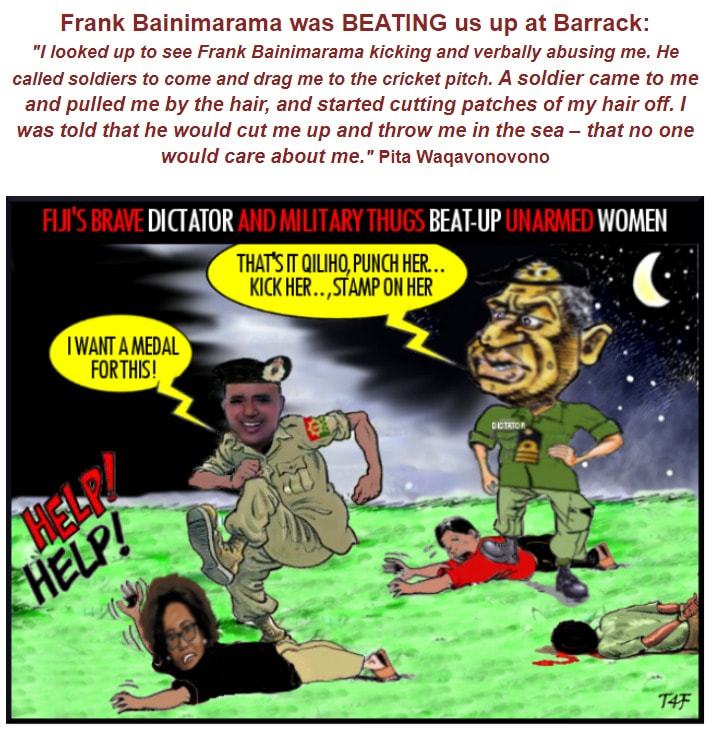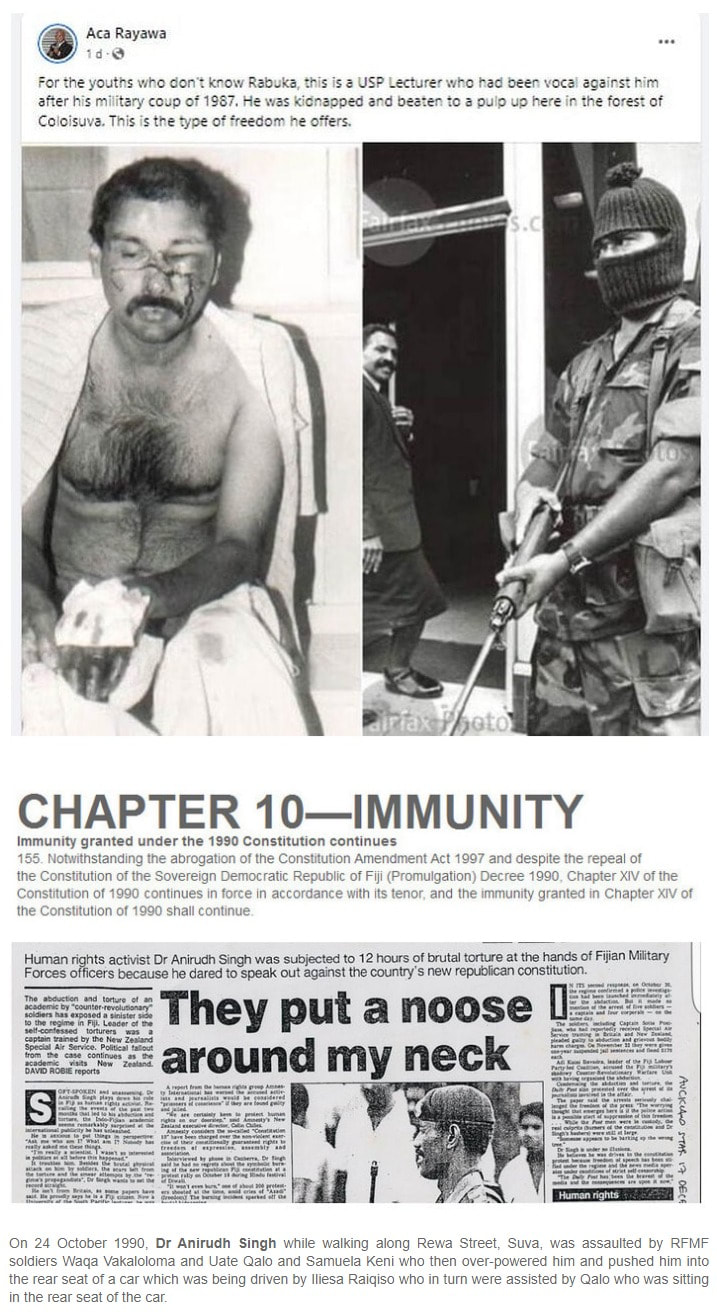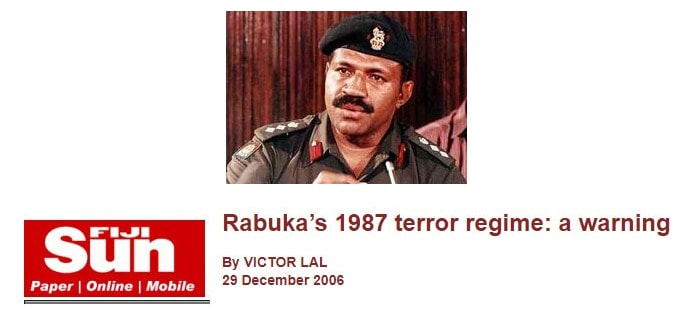SIX YEARS later, the Levestam family confirm Fijileaks story and now want to file Police Complaint against the suspended COMPOL SITIVENI QILIHO. |
*1 February 2023 to Fijileaks Founding Editor in Chief:
"Bula Vinaka, Am planning on pursuing my son's case against former COMPOL, what you wrote are facts, of the incident.
It's time to rock the boat on social media help please. Vinaka."
*I was at home the day Giliho [Qiliho] brought Tristan home all beaten up, we were in Nadi then. Giliho [Qiliho] should have taken my son to the Nadi hospital, but instead brought him home. I guess to avoid questions and statements at the hospital. My self and my wife then took Tristan to Dr Zens medical."
From Fijileaks Archive, 13 June 2017
"The soldiers cut Singh's hair, burnt it with cigarettes and disappeared into the darkness, taking Singh's shoes with them and leaving him alone in the dark in the forested hill."
The car was then driven to Colo-i-Suva where Singh was blindfolded by putting pads on both eyes before a strip of cloth was tied around his head in a blind-fold and a balaclava pulled securely over his head and tied around his neck. Singh was then walked into the woodland where his hands were tied behind him after which he was made to sit down and another rope then tied around his feet and slung around his neck. He said one of the soldiers sat behind him holding a noose around his head and keeping him pulled backwards.
Singh was told not to make any sound or try to escape. Afterwards he was repeatedly punched and kicked violently in the head, face and body and interrogated whilst he remained defencelessly bound. His captivity lasted some 11 hours.
Towards night fall, the five soldiers either jointly or severally put on dark balaclavas and unbound Singh. He was then assaulted violently on the head and face from both sides for a prolonged period lasting some 10 minutes and methodically smashed up both his hands with a metal pipe furnished with a wooden handle. Afterwards, the soldiers cut Singh's hair, burnt it with cigarettes and disappeared into the darkness, taking Singh's shoes with them and leaving him alone in the dark in the forested hill.
As a result of this abduction and torture Singh was hospitalised for three weeks at the Colonial War Memorial Hospital in Suva and he suffered the following injuries: (a) Facial bruising around the left eye and orbit with sub-conjunctival haemorrhage;(b) Rope burns around both wrists;(c) Fracture of right radial styloid;(d) Compound fracture of the left fifth finger; (e) Fracture of base of fifth meta-carpal;(f) Abrasions of both hands;(g) Superficial burns of left shoulder and right forearm consistent with cigarette burns;(h) Contusions of anterior chest wall; and (i) Decreased sensation of left hand due to neuropraxia (bruising) of radial nerve from the wrist-rope. The brutal soldiers were led by SOTIA PONJIASI.
Bizarrely, instead of putting the torturers on trial, Singh and six others had been charged in the Magistrates' Court of Suva on two counts of (1) having burnt a copy of the [racist 1990] Constitution of the Republic of Fiji on 18th October 1990 with seditious intention contrary to section 65(1)(iv) and 66(1)(a) of the Penal Code and (2) having taken part in an unlawful assembly on the same day contrary to section 86 and 87 of the Penal Code.
Singh was told not to make any sound or try to escape. Afterwards he was repeatedly punched and kicked violently in the head, face and body and interrogated whilst he remained defencelessly bound. His captivity lasted some 11 hours.
Towards night fall, the five soldiers either jointly or severally put on dark balaclavas and unbound Singh. He was then assaulted violently on the head and face from both sides for a prolonged period lasting some 10 minutes and methodically smashed up both his hands with a metal pipe furnished with a wooden handle. Afterwards, the soldiers cut Singh's hair, burnt it with cigarettes and disappeared into the darkness, taking Singh's shoes with them and leaving him alone in the dark in the forested hill.
As a result of this abduction and torture Singh was hospitalised for three weeks at the Colonial War Memorial Hospital in Suva and he suffered the following injuries: (a) Facial bruising around the left eye and orbit with sub-conjunctival haemorrhage;(b) Rope burns around both wrists;(c) Fracture of right radial styloid;(d) Compound fracture of the left fifth finger; (e) Fracture of base of fifth meta-carpal;(f) Abrasions of both hands;(g) Superficial burns of left shoulder and right forearm consistent with cigarette burns;(h) Contusions of anterior chest wall; and (i) Decreased sensation of left hand due to neuropraxia (bruising) of radial nerve from the wrist-rope. The brutal soldiers were led by SOTIA PONJIASI.
Bizarrely, instead of putting the torturers on trial, Singh and six others had been charged in the Magistrates' Court of Suva on two counts of (1) having burnt a copy of the [racist 1990] Constitution of the Republic of Fiji on 18th October 1990 with seditious intention contrary to section 65(1)(iv) and 66(1)(a) of the Penal Code and (2) having taken part in an unlawful assembly on the same day contrary to section 86 and 87 of the Penal Code.
“Every time we shrug when we hear of another midnight raid, the cries of terrorized women and children, then somewhere in Fiji another potential [Klaus] Barbie [The Nazi Butcher of Lyon in France] is getting a start in life,” said the former Methodist communications secretary in 1987, the Reverend Akuila Yabaki
“Every time we shrug when we hear of another midnight raid, the cries of terrorized women and children, then somewhere in Fiji another potential [Klaus] Barbie [The Nazi Butcher of Lyon in France] is getting a start in life,” said the former Methodist communications secretary in 1987, the Reverend Akuila Yabaki, now head of the Citizens Constitutional Forum. He was speaking out against the reign of terror and torture practised mostly against the Indo-Fijian community by Sitiveni Rabuka, his military henchmen, prominent chiefs, and the dreaded and racist Fijian taukei foot soldiers following the 1987 coups.
Now, nearly twenty years later, we are beginning to hear the first ripples of ‘torture tactics’ by the military against the pro-democracy supporters. But let us hope and pray that Commodore Frank Bainimarama’s military will not go down the road that Mr Rabuka took his troops, chiefs, and taukeists like Apisai Tora to achieve his objective of ‘Fiji for the taukei Fijians’.
The first casualty was the media when Mr Rabuka launched his coup on 14 May 1987. In an editorial on 15 May, the old Fiji Sun asked: “What right has a third-ranking officer to attack the scared institutions of Parliament? To presume he knows how best this country shall be governed for the good of all? The answer is: NONE. The people must decide their own future: not self-promoting dictators and not a Council appointed by and presided over by Lieutenant-Colonel Rabuka. But was he encouraged by others to act? And if so, who were they?”
We now know who they were, and many of those are still around, in positions of influence and authority. Most of them were prominent paramount chiefs, civil servants, church leaders, lawyers, magistrates, judges, and fallen politicians. They were indigenous Fijians, some of whom, and their offspring, are today hiding from the military in a great game of hide and seek following the 5 December coup. The former governor-general and Mr Rabuka’s paramount chief Ratu Sir Penaia Ganilau, made it easier for Mr Rabuka to crush civil disobedience by warning that the civilian-cum military regime would not hesitate to use emergency powers it had under martial law.
On 15 May 1987, shortly after the Fiji Sun editorial, the Ministry of Information directed the Fiji Times and Fiji Sun to cease publication. The RFMF occupied Radio Fiji. The same day armed soldiers’ ejected staff of both the two newspapers from their offices, and foreign journalists were questioned by the RFMF. In a sickening spectacle, the raid on the Times office was led by one of its own reporters and army reservist E.T. Volavola in full combat gear carrying a rifle and backed up by a squad of troops.
Mr Rabuka announced a Council of Ministers (COM), which was dominated by ex-Alliance Party Ministers (including Ratu Mara who had lost the election to Dr Timoci Bavadra). Mr Rabuka said his military regime was in full control and the people had accepted the coup, and called on the international community to recognize his regime. He said he had abrogated the Constitution and the regime would govern Fiji by decree. He brushed aside the demands of the Council of Churches “in the name of Christianity” to release the MPs he had kidnapped and was holding as hostages, and “surrender to the sovereign authority of the land”, and restore “our duly elected government”.
He instead moved into deposed Prime Minister Dr Bavadra’s office. But when the Fiji Sun questioned Mr Rabuka’s right to occupy high office, he threw the general manager and one of the directors, who was also President of the Fiji Law Society, in the same prison cell as that occupied by Dr Bavadra. The Sun was singled out for severe maltreatment. Sadly, most of the harassment and intimidation was carried out against the Indo-Fijian journalists, for after all, Mr Rabuka had executed the coup to give Fijians the control of Fiji.
Some Fijian journalists, therefore, switched sides, and became Mr Rabuka’s propagandists, reporting on their Indo-Fijian colleagues and their families. In the end, the Fiji Times agreed to operate under partial military censorship, while the old Fiji Sun was forced to cease operations in the country after it published allegations that Mr Rabuka had bought a house in Suva favoured by wealthy Indo-Fijians and expatriates, on a 100% mortgage from a prominent Alliance politician. In the end, some of Fiji’s best Indo-Fijian journalists were forced to emigrate or seek political asylum abroad. Some of us were not only on Mr Rabuka’s hit list but even had our passports confiscated, ending up overnight from being citizens to wandering international refugees.
The next group that Mr Rabuka and his cronies targeted were his political opponents. Shortly before the coup the taukeists firebombed the law offices of Jai Ram Reddy, now an International Criminal Court judge. The late Sir Vijay Singh was detained and his passport seized, prompting him to ask: “What kind of normalcy is [Ganilau] thinking about when things like this happen.”
Dr Bavadra’s spokesman and current Suva lawyer Richard Naidu was arrested and detained on different occasions. He was chased and beaten up by Taukeists, and finally had his Fiji nationality revoked, and ordered to leave the country for New Zealand. Another legal adviser of Dr Bavadra, John Cameron, had his work permit withdrawn after he filed civil suit against dissolution of Parliament, and had also filed claim with the Supreme Court on behalf of a client harassed by the RFMF, seeking a declaration that State of Emergency and 1987 Emergency Regulations were unconstitutional.
Among judges arrested included Justices Kishore Govind and Rooney, including Chief Magistrate Howard Morrison. Even the Police Commissioner, an Indo-Fijian Pramesh Raman, whose job Mr Rabuka had applied a week before the coup, was taken into custody. Several Indo-Fijian lawyers and academics were also taken into custody, mostly on legal advice of some Fijian lawyers.
Although the vast majority of victims were Indo-Fijians, some prominent Fijians like Amelia Rokotuivanua and Dr Steven Ratuva came in for rough treatment. The two were “lectured” by Lieutenant Pio Wong on how to be “true Fijians” and Dr Ratuva had spells in detention, and at one point the military allegedly tried to poison him with the prepared food it had brought to his house. In 1986 he had claimed in a paper that the RFMF’s only function lay in internal repression or as a conduit for chiefly advancement. He had also suggested that “intermarriages between the sons and daughters of chiefs (including the chiefly officers in the army) helps to consolidate the chiefly comprador clique which ensures the perpetuation of nepotism and inequality in Fijian society”.
On 25 September Mr Rabuka carried out his second coup. Violence and intimidation was encouraged, and a group of escaped prisoners were escorted by the military to march to the Government House to demand pardons. When the GCC refused to recognise Mr Rabuka as president, he declared Fiji a republic, declared himself the head of state and no longer recognised the GCC as such. However, on 5 December he agreed to hand over power to the new President Ratu Penaia and the Prime Minister Ratu Mara. Mr Rabuka took charge of Home Affairs, the CJ returned to the bench, Sailosi Kepa was recalled as High Commissioner from London to take over as Minister for Justice and A-G, and Berenado Vunibobo became Minister of Trade and Commerce. Dr Bavadra retorted: “It is a military government in a civilian cloak.”
The international community resumed trade and diplomatic links with Fiji. Australia conferred Mr Rabuka legitimacy by announcing that it was recognizing Fiji as a state rather than the government of Fiji. Ratu Penaia granted Mr Rabuka and his close circle of oppressors, questionable amnesty, and the Fijians introduced apartheid against the Indo-Fijians. Ratu Penaia also formally signed new Internal Security Decree, giving army power to shoot to kill anyone found with illegal arms that resisted arrests.
As Minister for Internal Security, Mr Rabuka had extraordinary range of powers, which violated international standards of human rights, including the detention of any person for two years; order restriction of movement, freedom of expression, employment, residence or activity; prohibit the printing, publication, sale, issue, circulation or possession of any written material, and prohibit its communication through word of mouth etc.
And yet Mr Rabuka was free to publish his book “No Other Way”. But no criticism of his book was permitted, and one USP Indo-Fijian lecturer who dared to criticise it, was detained and severely beaten up. My own critical counter-book Fiji: Coups in Paradise was banished from the bookshelves of Fiji. As Mr Rabuka plunged the economy into a decline, he was offered $50,000 from an Australian publishing company as a retainer for his book and a TV documentary. The RFMF, commenting on brief detentions and harassment said, “Due to the current conditions everyone is suspect until proven innocent”. Mr Rabuka went on to become the Prime Minister and chairman of the Great Council of Chiefs on the bandwagon of nationalist and racist ideology, an ideology which Commodore Bainimarama claims he wants to stamp out once and for all.
If that is so, let us hope that he will not follow in the footsteps of Mr Rabuka, for many of my own family members still bear the scars of Mr Rabuka’s storm troopers on their chests, and so do many other citizens from the 1987 and 2000 coups.
The Indo-Fijians, in 1987, were beaten, forced to stand in sewage pools, and subjected to other forms of humiliating punishments.
The vast majority of Fijians remained silent to the oppression and racism in their midst. In fact, many joined in its continuation for the next ten years.
But freedom, as former military strongman Mr Rabuka found out only very recently (after he was successfully defended by the President of the Fiji Law Society, Mr Sharma, on inciting mutiny), is a cherished and inviolable right.
Now, nearly twenty years later, we are beginning to hear the first ripples of ‘torture tactics’ by the military against the pro-democracy supporters. But let us hope and pray that Commodore Frank Bainimarama’s military will not go down the road that Mr Rabuka took his troops, chiefs, and taukeists like Apisai Tora to achieve his objective of ‘Fiji for the taukei Fijians’.
The first casualty was the media when Mr Rabuka launched his coup on 14 May 1987. In an editorial on 15 May, the old Fiji Sun asked: “What right has a third-ranking officer to attack the scared institutions of Parliament? To presume he knows how best this country shall be governed for the good of all? The answer is: NONE. The people must decide their own future: not self-promoting dictators and not a Council appointed by and presided over by Lieutenant-Colonel Rabuka. But was he encouraged by others to act? And if so, who were they?”
We now know who they were, and many of those are still around, in positions of influence and authority. Most of them were prominent paramount chiefs, civil servants, church leaders, lawyers, magistrates, judges, and fallen politicians. They were indigenous Fijians, some of whom, and their offspring, are today hiding from the military in a great game of hide and seek following the 5 December coup. The former governor-general and Mr Rabuka’s paramount chief Ratu Sir Penaia Ganilau, made it easier for Mr Rabuka to crush civil disobedience by warning that the civilian-cum military regime would not hesitate to use emergency powers it had under martial law.
On 15 May 1987, shortly after the Fiji Sun editorial, the Ministry of Information directed the Fiji Times and Fiji Sun to cease publication. The RFMF occupied Radio Fiji. The same day armed soldiers’ ejected staff of both the two newspapers from their offices, and foreign journalists were questioned by the RFMF. In a sickening spectacle, the raid on the Times office was led by one of its own reporters and army reservist E.T. Volavola in full combat gear carrying a rifle and backed up by a squad of troops.
Mr Rabuka announced a Council of Ministers (COM), which was dominated by ex-Alliance Party Ministers (including Ratu Mara who had lost the election to Dr Timoci Bavadra). Mr Rabuka said his military regime was in full control and the people had accepted the coup, and called on the international community to recognize his regime. He said he had abrogated the Constitution and the regime would govern Fiji by decree. He brushed aside the demands of the Council of Churches “in the name of Christianity” to release the MPs he had kidnapped and was holding as hostages, and “surrender to the sovereign authority of the land”, and restore “our duly elected government”.
He instead moved into deposed Prime Minister Dr Bavadra’s office. But when the Fiji Sun questioned Mr Rabuka’s right to occupy high office, he threw the general manager and one of the directors, who was also President of the Fiji Law Society, in the same prison cell as that occupied by Dr Bavadra. The Sun was singled out for severe maltreatment. Sadly, most of the harassment and intimidation was carried out against the Indo-Fijian journalists, for after all, Mr Rabuka had executed the coup to give Fijians the control of Fiji.
Some Fijian journalists, therefore, switched sides, and became Mr Rabuka’s propagandists, reporting on their Indo-Fijian colleagues and their families. In the end, the Fiji Times agreed to operate under partial military censorship, while the old Fiji Sun was forced to cease operations in the country after it published allegations that Mr Rabuka had bought a house in Suva favoured by wealthy Indo-Fijians and expatriates, on a 100% mortgage from a prominent Alliance politician. In the end, some of Fiji’s best Indo-Fijian journalists were forced to emigrate or seek political asylum abroad. Some of us were not only on Mr Rabuka’s hit list but even had our passports confiscated, ending up overnight from being citizens to wandering international refugees.
The next group that Mr Rabuka and his cronies targeted were his political opponents. Shortly before the coup the taukeists firebombed the law offices of Jai Ram Reddy, now an International Criminal Court judge. The late Sir Vijay Singh was detained and his passport seized, prompting him to ask: “What kind of normalcy is [Ganilau] thinking about when things like this happen.”
Dr Bavadra’s spokesman and current Suva lawyer Richard Naidu was arrested and detained on different occasions. He was chased and beaten up by Taukeists, and finally had his Fiji nationality revoked, and ordered to leave the country for New Zealand. Another legal adviser of Dr Bavadra, John Cameron, had his work permit withdrawn after he filed civil suit against dissolution of Parliament, and had also filed claim with the Supreme Court on behalf of a client harassed by the RFMF, seeking a declaration that State of Emergency and 1987 Emergency Regulations were unconstitutional.
Among judges arrested included Justices Kishore Govind and Rooney, including Chief Magistrate Howard Morrison. Even the Police Commissioner, an Indo-Fijian Pramesh Raman, whose job Mr Rabuka had applied a week before the coup, was taken into custody. Several Indo-Fijian lawyers and academics were also taken into custody, mostly on legal advice of some Fijian lawyers.
Although the vast majority of victims were Indo-Fijians, some prominent Fijians like Amelia Rokotuivanua and Dr Steven Ratuva came in for rough treatment. The two were “lectured” by Lieutenant Pio Wong on how to be “true Fijians” and Dr Ratuva had spells in detention, and at one point the military allegedly tried to poison him with the prepared food it had brought to his house. In 1986 he had claimed in a paper that the RFMF’s only function lay in internal repression or as a conduit for chiefly advancement. He had also suggested that “intermarriages between the sons and daughters of chiefs (including the chiefly officers in the army) helps to consolidate the chiefly comprador clique which ensures the perpetuation of nepotism and inequality in Fijian society”.
On 25 September Mr Rabuka carried out his second coup. Violence and intimidation was encouraged, and a group of escaped prisoners were escorted by the military to march to the Government House to demand pardons. When the GCC refused to recognise Mr Rabuka as president, he declared Fiji a republic, declared himself the head of state and no longer recognised the GCC as such. However, on 5 December he agreed to hand over power to the new President Ratu Penaia and the Prime Minister Ratu Mara. Mr Rabuka took charge of Home Affairs, the CJ returned to the bench, Sailosi Kepa was recalled as High Commissioner from London to take over as Minister for Justice and A-G, and Berenado Vunibobo became Minister of Trade and Commerce. Dr Bavadra retorted: “It is a military government in a civilian cloak.”
The international community resumed trade and diplomatic links with Fiji. Australia conferred Mr Rabuka legitimacy by announcing that it was recognizing Fiji as a state rather than the government of Fiji. Ratu Penaia granted Mr Rabuka and his close circle of oppressors, questionable amnesty, and the Fijians introduced apartheid against the Indo-Fijians. Ratu Penaia also formally signed new Internal Security Decree, giving army power to shoot to kill anyone found with illegal arms that resisted arrests.
As Minister for Internal Security, Mr Rabuka had extraordinary range of powers, which violated international standards of human rights, including the detention of any person for two years; order restriction of movement, freedom of expression, employment, residence or activity; prohibit the printing, publication, sale, issue, circulation or possession of any written material, and prohibit its communication through word of mouth etc.
And yet Mr Rabuka was free to publish his book “No Other Way”. But no criticism of his book was permitted, and one USP Indo-Fijian lecturer who dared to criticise it, was detained and severely beaten up. My own critical counter-book Fiji: Coups in Paradise was banished from the bookshelves of Fiji. As Mr Rabuka plunged the economy into a decline, he was offered $50,000 from an Australian publishing company as a retainer for his book and a TV documentary. The RFMF, commenting on brief detentions and harassment said, “Due to the current conditions everyone is suspect until proven innocent”. Mr Rabuka went on to become the Prime Minister and chairman of the Great Council of Chiefs on the bandwagon of nationalist and racist ideology, an ideology which Commodore Bainimarama claims he wants to stamp out once and for all.
If that is so, let us hope that he will not follow in the footsteps of Mr Rabuka, for many of my own family members still bear the scars of Mr Rabuka’s storm troopers on their chests, and so do many other citizens from the 1987 and 2000 coups.
The Indo-Fijians, in 1987, were beaten, forced to stand in sewage pools, and subjected to other forms of humiliating punishments.
The vast majority of Fijians remained silent to the oppression and racism in their midst. In fact, many joined in its continuation for the next ten years.
But freedom, as former military strongman Mr Rabuka found out only very recently (after he was successfully defended by the President of the Fiji Law Society, Mr Sharma, on inciting mutiny), is a cherished and inviolable right.
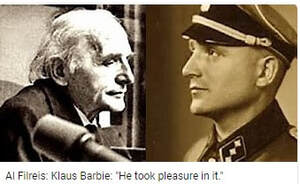
Nikolaus "Klaus" Barbie (25 October 1913 – 25 September 1991) was a German operative of the SS and SD who worked in Vichy France during World War II. He became known as the "Butcher of Lyon" for having personally tortured prisoners—primarily Jews and members of the French Resistance—as the head of the Gestapo in Lyon.
After the war, United States intelligence services employed him for his anti-communist efforts and aided his escape to Bolivia, where he advised the dictatorial regime on how to repress opposition through torture.
In 1983, the United States apologised to France for aiding Barbie's escape from an outstanding arrest warrant.
In 1972, it was discovered he was in Bolivia. While in Bolivia, the West German Intelligence Service recruited him. Barbie is suspected of having had a role in the Bolivian coup d'état orchestrated by Luis García Meza in 1980.
After the fall of the dictatorship, Barbie lost the protection of the government in La Paz. In 1983, he was arrested and extradited to France, where he was convicted of crimes against humanity and sentenced to life in prison.
Although he had been sentenced to death in absentia twice earlier, in 1947 and 1954, capital punishment had been abolished in France in 1981.
Barbie died of cancer in prison in 1991, at age 77.
After the war, United States intelligence services employed him for his anti-communist efforts and aided his escape to Bolivia, where he advised the dictatorial regime on how to repress opposition through torture.
In 1983, the United States apologised to France for aiding Barbie's escape from an outstanding arrest warrant.
In 1972, it was discovered he was in Bolivia. While in Bolivia, the West German Intelligence Service recruited him. Barbie is suspected of having had a role in the Bolivian coup d'état orchestrated by Luis García Meza in 1980.
After the fall of the dictatorship, Barbie lost the protection of the government in La Paz. In 1983, he was arrested and extradited to France, where he was convicted of crimes against humanity and sentenced to life in prison.
Although he had been sentenced to death in absentia twice earlier, in 1947 and 1954, capital punishment had been abolished in France in 1981.
Barbie died of cancer in prison in 1991, at age 77.
